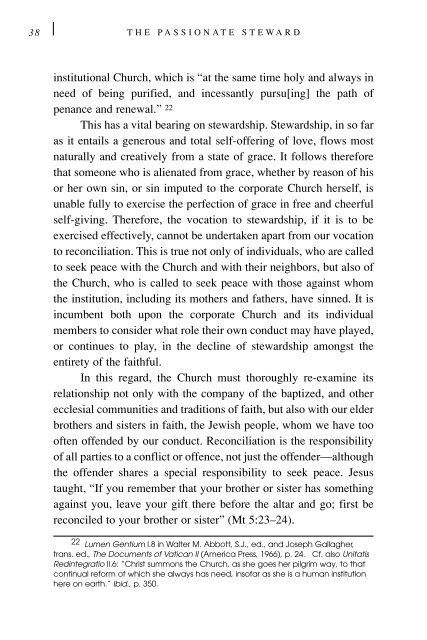Passionate Steward - 10th Anniversary Edition
10th Anniversary Edition of The Passionate Steward - Recovering Christian Stewardship from Secular Fundraising (St. Brigid Press - 2002).
10th Anniversary Edition of The Passionate Steward - Recovering Christian Stewardship from Secular Fundraising (St. Brigid Press - 2002).
Create successful ePaper yourself
Turn your PDF publications into a flip-book with our unique Google optimized e-Paper software.
38 THE PASSIONATE STEWARD<br />
institutional Church, which is “at the same time holy and always in<br />
need of being purified, and incessantly pursu[ing] the path of<br />
penance and renewal.” 22<br />
This has a vital bearing on stewardship. <strong>Steward</strong>ship, in so far<br />
as it entails a generous and total self-offering of love, flows most<br />
naturally and creatively from a state of grace. It follows therefore<br />
that someone who is alienated from grace, whether by reason of his<br />
or her own sin, or sin imputed to the corporate Church herself, is<br />
unable fully to exercise the perfection of grace in free and cheerful<br />
self-giving. Therefore, the vocation to stewardship, if it is to be<br />
exercised effectively, cannot be undertaken apart from our vocation<br />
to reconciliation. This is true not only of individuals, who are called<br />
to seek peace with the Church and with their neighbors, but also of<br />
the Church, who is called to seek peace with those against whom<br />
the institution, including its mothers and fathers, have sinned. It is<br />
incumbent both upon the corporate Church and its individual<br />
members to consider what role their own conduct may have played,<br />
or continues to play, in the decline of stewardship amongst the<br />
entirety of the faithful.<br />
In this regard, the Church must thoroughly re-examine its<br />
relationship not only with the company of the baptized, and other<br />
ecclesial communities and traditions of faith, but also with our elder<br />
brothers and sisters in faith, the Jewish people, whom we have too<br />
often offended by our conduct. Reconciliation is the responsibility<br />
of all parties to a conflict or offence, not just the offender—although<br />
the offender shares a special responsibility to seek peace. Jesus<br />
taught, “If you remember that your brother or sister has something<br />
against you, leave your gift there before the altar and go; first be<br />
reconciled to your brother or sister” (Mt 5:23–24).<br />
22 Lumen Gentium I.8 in Walter M. Abbott, S.J., ed., and Joseph Gallagher,<br />
trans. ed., The Documents of Vatican II (America Press, 1966), p. 24. Cf. also Unitatis<br />
Redintegratio II.6: “Christ summons the Church, as she goes her pilgrim way, to that<br />
continual reform of which she always has need, insofar as she is a human institution<br />
here on earth.” Ibid., p. 350.




